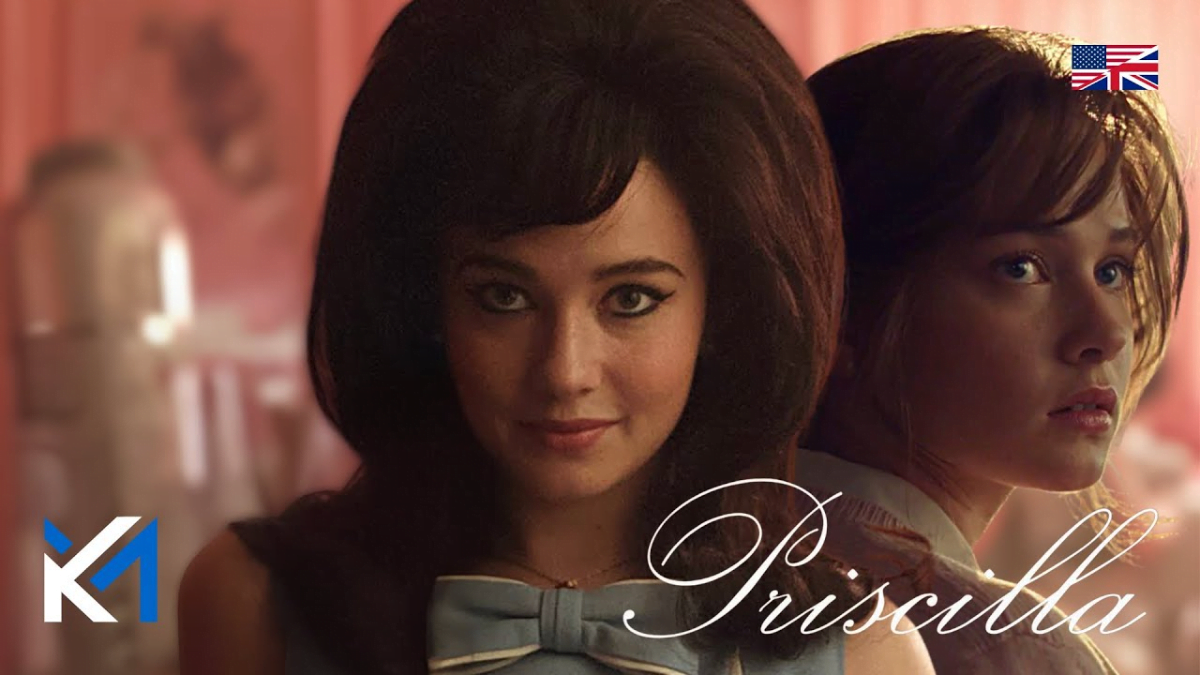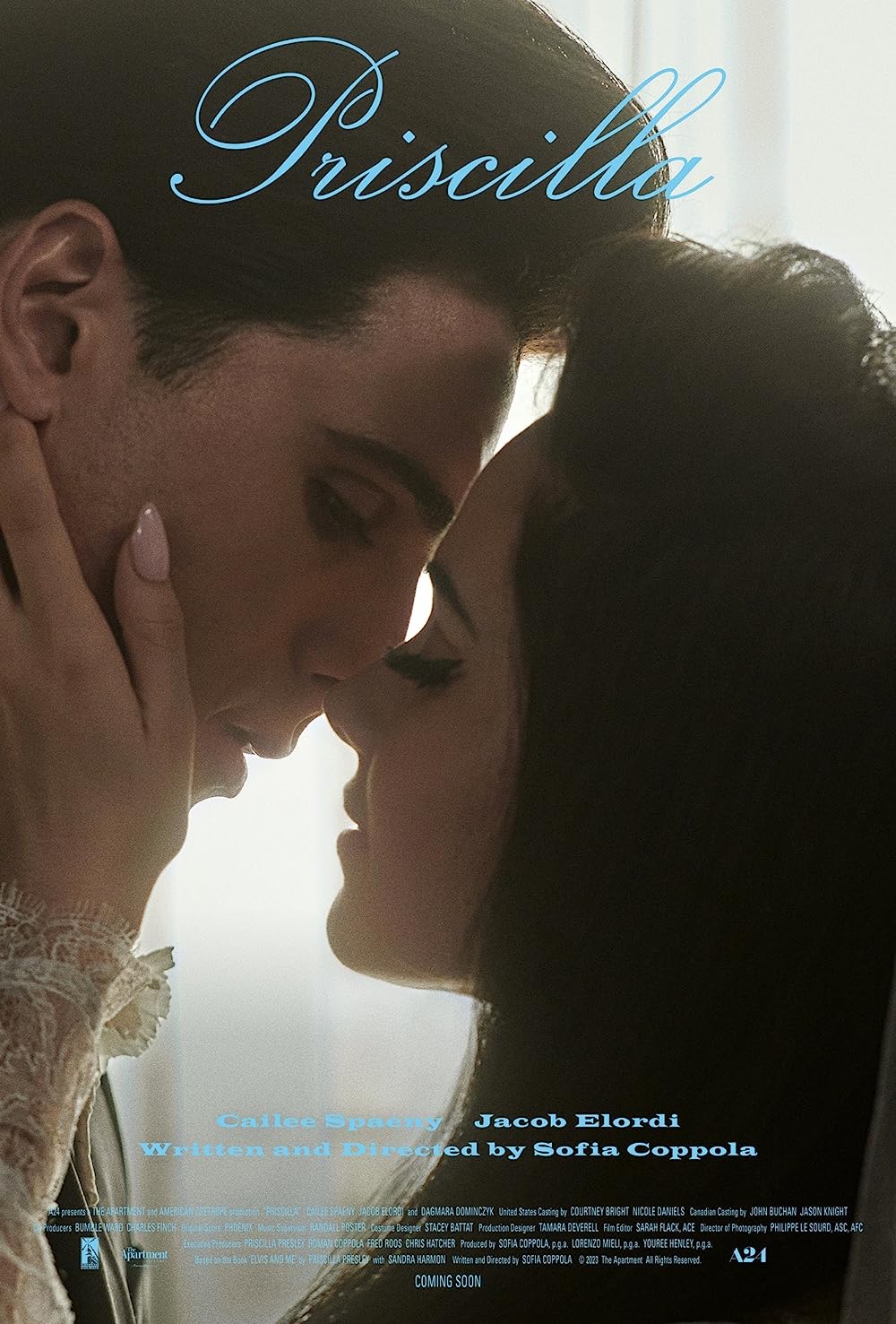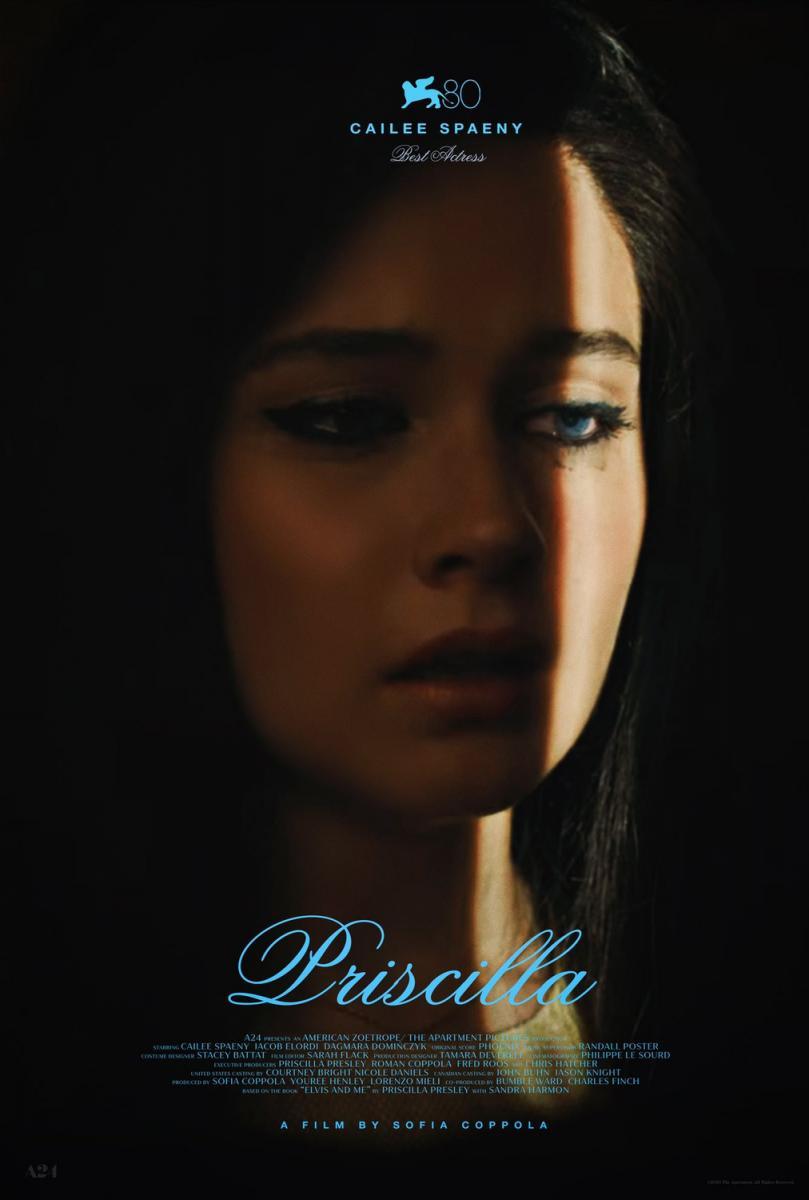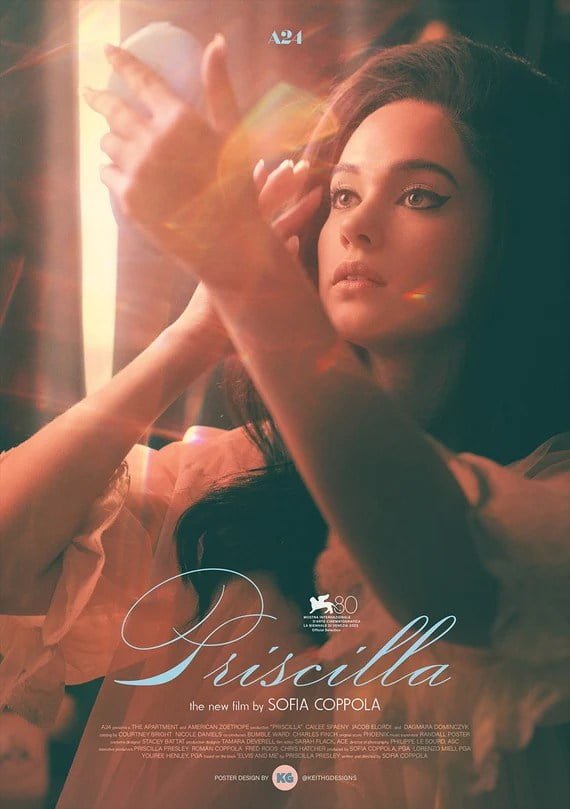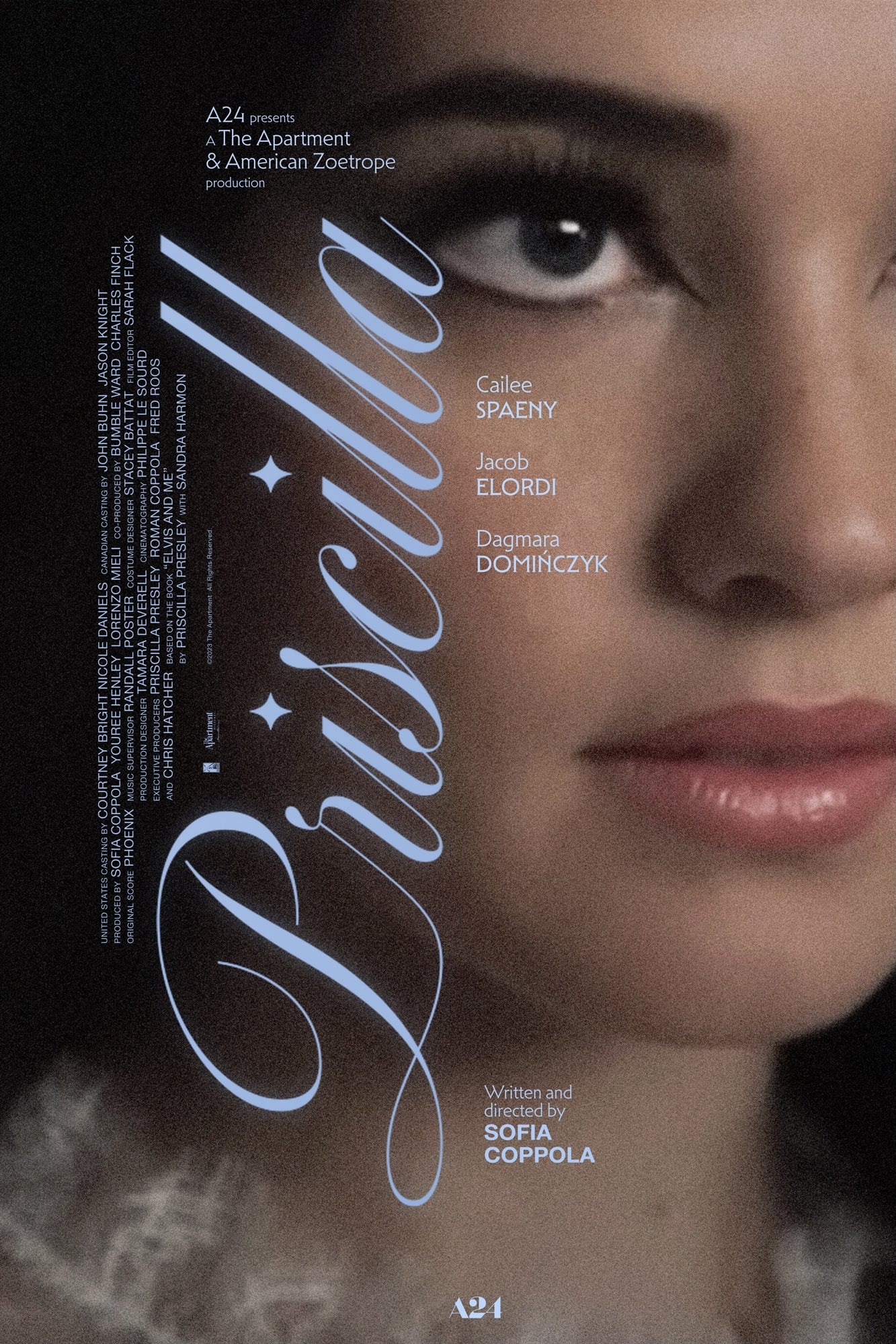Written, produced, and directed by Sofia Coppola, the newly released Priscilla hit the theatres on 15th December, 2023. Coppola’s quietly commendable work as a biographical American drama film with a pint of tragic theme in it, Priscilla, is based on Priscilla Presley’s 1985 memoir Elvis and Me. It retells the story of Elvis Presley from the viewpoint of the woman he married—a 14-year-old girl he met while he was already one of the world’s most popular singers. Thus, the film explores the romance between the titular character Priscilla (played by Cailey Spainey) who is a teenager and rock and roll sensation Elvis (played by Jacob Elordi). In 1959, while serving as a US Army soldier in Germany, 24-year-old Elvis meets 14-year-old Priscilla and the story takes it forward from there.
Exploring a relationship between people whose lives are entirely different, Elvis’s life of stardom ties down the young girl who is still in school. Portraying how stars are launched to celestial heights and how their descent may be just as bad, particularly when it comes to family matters, Sofia Coppola, through Priscilla, made a commendable nuanced examination of Elvis Presley’s turbulent marriage through his partner Priscilla Ann Presley’s shoes.
Was there a burning love, to begin with?
Coppola’s Priscilla intensifies the cruelty of loneliness by centring it upon someone else compared to the story of the first film and with the film placing the viewers in the girl’s position, where the story progresses with a teenager and a man who is 10 years older than her, many questions revolt against the appealling portrayal of their relationship.
In the initial scenes, with both Elvis and Priscilla on screen, we see, at a cafe on an air force base in West Germany in 1959, Priscilla who will shortly gain a great deal of recognition for her sensitive, unpredictable performance, Is being approached by one of Elvis’s friends (Luke Humphrey). Elvis, who was conscripted into the military, is known to like conversing with other people from back home, so he extends an invitation to Priscilla to a party at his residence there.
Exploring a relationship between people whose lives are entirely different, Elvis’s life of stardom ties down the young girl who is still in school.
Elvis who is supposedly ten years older than her and who is very well aware that she is in the ninth grade, asks, ‘What do you say we go somewhere real quiet?’ In a modern context, the power relationship is reprehensible, and Priscilla goes to great lengths to reassure viewers that Elvis is not going to coerce her into having sex that night. But before informing her it is time to go, he does kiss her.
No matter how much the film defends that, it feels dreadful to see a teenage girl with an older man and it is very hard to not question the dynamic of her being a child.
The film supposedly travels through the titular character Priscilla’s journey. However, Coppola, who also wrote the screenplay and directed the film, makes it obvious that the relationship is already very much on Elvis’s terms where Elvis sets and controls Priscilla’s schedule right from the beginning.
Elvis has complete control over every element of Priscilla’s life, from the colour of her hair to her consumption of drugs to her clothing. Even as we are tempted by the glitter, money, and adoration of the luxurious lifestyle, we become alarmed by Priscilla’s lack of control over her life.
Eventually, once Priscilla relocates to Graceland permanently, we see Elvis, who is not present to welcome her, leave a dog to keep her company, a reflection of how treats her as if she were his pet. It is also shown how he refuses her to work when he says: ‘You’ve got a career now, baby.’
Eventually, once Priscilla relocates to Graceland permanently, we see Elvis, who is not present to welcome her, leave a dog to keep her company, a reflection of how treats her as if she were his pet.
You need to be there when I call,’ Elvis says this over the phone, sweetly but dismissively. It is a picture of what a young, vulnerable, star-struck girl’s life may become when her life is completely controlled by another. Elvis even controls the kind of dress she wears, with the scene where he and his friends sit like some kinf of audience judging her clothes, choosing outfits for her, depicting how he dictates what she does and does not do.
Portrayal of intimate partner violence in Priscilla
Elvis is portrayed as a man who is entrapped in his stardom and loss of family right from the beginning. Priscilla is seen as his go-to place of solace, even if it is to show anger, pain or lust. There are many instances where he gets physically violent, starting with a silly pillow fight in a scene where he tends to go a little further in hurting her. In another instance where she gets angry with a rumour, he holds her hand in a way that is abusive.
He also apologises immediately for his acts, showing how controlling he can get to the point that it turns out to be manipulative and gaslighting in the name of love. Priscilla, who is an emotionally dependent partner to Elvis is emotionally abused constantly in a way that it is covered up as anger, love and even grief, leading her to lose her individuality eventually.
From the time Elvis returns home, he gets accompanied by the ‘Memphis Mafia,’ a raucous bunch of male friends who make living at Graceland an ‘everyday party’.
From the time Elvis returns home, he gets accompanied by the ‘Memphis Mafia,’ a raucous bunch of male friends who make living at Graceland an ‘everyday party’. Living with Elvis entails living with his entourage, according to Priscilla. They are not alone, as Coppola portrays it. Even after she informs him that she is pregnant they are surrounded by the men. In many incidents, he even acts violently and tries to cover it up with apologies. Furious at her in a scene, he even tosses a chair that just misses her head.
Reflection of several women’s lives in Priscilla
Towards the end of the film, we see how eventually, with age and experience, Priscilla decides to end their marriage. Coppola’s directing is adequate in that this film never becomes about the man as it progresses. For the most part, we do not see or hear any of Presley’s musical performances. He is the myth, created by his obedient wife’s desire for him. At least, that is the version she sees slowly fade away.
Priscilla shows how with mature age and experience comes the humbling understanding of the myriad fiefdoms that spring up around renowned, powerful persons. There are many women even today who have settled for a life like Priscilla, to live under the shadow of a man, and there are many women who have realised what they wanted and set themselves free of any barriers in terms of love. From a teenage girl who wanted to mother him during his grief to choosing herself and ending it, the character of Priscilla has come a long way.
Having said all that, Priscilla remains emotional and profound. Spaeny is brilliant in a star-making performance that forces her to internalise the woman’s complicated memory rather than give it a straightforward voice. We observe a budding flower grow, get plucked by time, and wilt away, not from a storm, but from the slow realisation that fame spoils the soil it is intended to nurture. It is a classic narrative that also feels ridiculously recurring, reflecting many lives we see, hear and experience.
But that is what unrivalled attention, power, and choice can do to someone. It gives you the impression that you are in command. Presley does, for the most part, have this religious grasp over Priscilla’s life and sense of self.
If the film’s ultimate aim was to paint an honest image of what it must have been like for a young girl to grow up as a most valued possession of a rock star in his house, the film surely can take credit for that.
This is in a way a depiction of many women’s lives where they are believed to be trapped in one single role of a prised possession role of a ‘wife’. It shows the small role a woman might be consigned to in return for the privilege of being a superstar’s wife. To that aim, Coppola’s picture is a delicate, unsettling and imperfect portrayal of life spent in the shadow of a broken celebrity.
